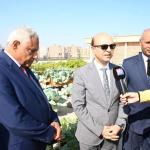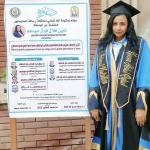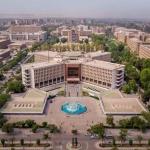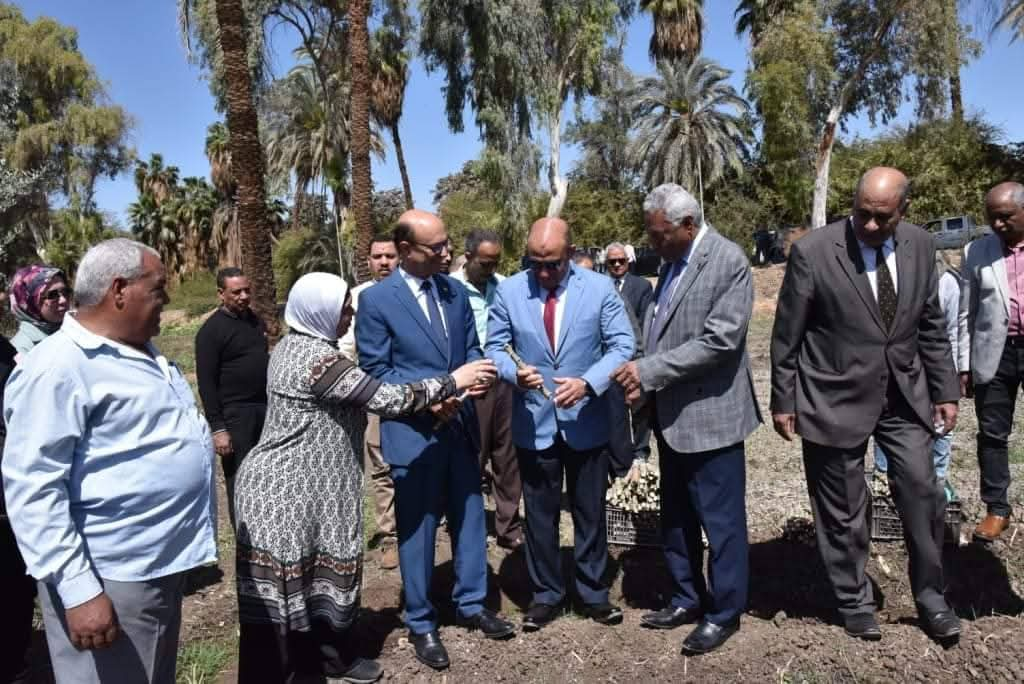
جامعة أسيوط تواصل دورها التنموي بزراعة الكسافا لدعم الأمن الغذائي وتحقيق التنمية المستدامة
- د. المنشاوي: جامعة أسيوط تحقق طفرة شاملة في التعليم والبحث والخدمات دعمًا للتنمية الوطنية المستدامة
- زراعة الكسافا في مزارع جامعة أسيوط.. نموذج فريد لدعم المشروعات البحثية والتطبيقية ذات البُعد التنموي
- الكسافا.. محصول غذائي واعد بفضل قيمته الغذائية العالية ويُعد ثالث أهم مصدر للسعرات الحرارية عالميًا بعد الأرز والذرة
- جامعة أسيوط تفتتح أول وحدة من نوعها بالجامعات المصرية لإنتاج دقيق الكسافا الخالي من الجلوتين لمرضى الحساسية الغذائية
شهدت جامعة أسيوط، برئاسة الدكتور أحمد المنشاوي، طفرة ملحوظة خلال الآونة الأخيرة على مختلف الأصعدة التعليمية والبحثية والخدمية، في إطار جهودها الرامية إلى دعم مسيرة التنمية الوطنية المستدامة، وتوظيف إمكاناتها البشرية والمادية لخدمة المجتمع.
وأكد الدكتور المنشاوي، أن جامعة أسيوط تضع ضمن أولوياتها إطلاق مشروعات ومبادرات بحثية تطبيقية تستهدف القضايا التنموية، مع الالتزام بالمعايير الدولية للبحث العلمي، والعمل على ربط مخرجات البحث باحتياجات سوق العمل، خاصة في ما يتعلق بقضايا الأمن الغذائي.
وفي هذا السياق، أطلقت الجامعة مشروع زراعة نبات الكسافا داخل مزرعة الخضر البحثية التابعة لكلية الزراعة، والذي يُعد من المحاصيل الاقتصادية الواعدة ذات الأهمية الاستراتيجية، تحت إشراف الدكتور جمال بدر، نائب رئيس الجامعة لشئون الدراسات العليا والبحوث ورئيس مجلس إدارة وحدة "استخراج الدقيق الخالي من الجلوتين والنشا من الكسافا" بمزرعة قسم الخضر، والدكتور عادل محمد محمود، عميد كلية الزراعة، والدكتورة داليا محمود طنطاوي، رئيس قسم الخضر والمشرف العلمي على المزرعة، ومدير الوحدة.
وأشاد الدكتور المنشاوي بهذا المشروع، مؤكدًا أن جامعة أسيوط تُعد أول جامعة في صعيد مصر تخطو نحو زراعة الكسافا، إدراكًا منها لأهمية هذا المحصول، وسعيًا لتوجيه البحوث الزراعية نحو الزراعة الحديثة وزيادة الإنتاج، في إطار رؤية الجامعة نحو قطاع إنتاجي تعليمي مستدام.
وأكد الدكتور المنشاوي، أن زراعة الكسافا تمثل نواة حقيقية لمشروعات تنموية واعدة تهدف إلى تحقيق الاكتفاء الغذائي المحلي وتقليل الاعتماد على الاستيراد، فضلًا عن دعم الصناعات الوطنية وتوفير فرص عمل لأبناء صعيد مصر.
وأشار إلى أن الجامعة ماضية في دعم وتطوير مزارعها الإنتاجية والبحثية لتعزيز دورها المجتمعي والمساهمة بفاعلية في خطط الدولة المصرية لتحقيق التنمية المستدامة الشاملة.
وأوضح الدكتور عادل محمد محمود أن مزرعة الخضر البحثية، التي تبلغ مساحتها 8 أفدنة، تضم العديد من محاصيل الخضر الموسمية، وتُزرع جميعها بدون مبيدات كيميائية، مشيرًا إلى أن نبات الكسافا يُعد من أبرز محاصيل المزرعة، ويُعرف بمحصول القرن، نظرًا لقيمته الغذائية المرتفعة، حيث يُعتبر ثالث أهم مصدر عالمي للسعرات الحرارية بعد الأرز والذرة.
من جانبها، أشارت الدكتورة داليا طنطاوي إلى أن نبات الكسافا يتميز بقدرته على النمو في ظروف مناخية صعبة، كما يُعد بديلاً غذائيًا استراتيجيًا للقمح والدقيق في إنتاج المخبوزات، فضلًا عن استخدامه في استخراج مواد لاصقة، واستخدام بقاياه كعلف للحيوانات.
وأضافت أن الكسافا يُطلق عليه "نبات الفقراء"، لما يوفره من درنات غنية بالنشا تصلح للعديد من الاستخدامات، منها إنتاج الدقيق والإيثانول الحيوي كوقود صديق للبيئة، إلى جانب استخدامه في الصناعات الغذائية المختلفة.
وفي خطوة جديدة نحو تعظيم الاستفادة من هذا المحصول، افتتحت جامعة أسيوط وحدة "استخراج الدقيق الخالي من الجلوتين والنشا من الكسافا" بمزرعة قسم الخضر.
وأكد الدكتور جمال بدر أن هذه الوحدة تُعد الأولى من نوعها على مستوى الجامعات المصرية، والمتخصصة في إنتاج دقيق الكسافا الخالي من الجلوتين، بما يجعله خيارًا غذائيًا صحيًا وآمنًا لمرضى الحساسية الغذائية، مشيرًا إلى أن مراحل التصنيع تشمل الغسيل والتقشير والفرم والكبس والتجفيف والطحن والتعبئة، باستخدام أحدث التقنيات المتوافقة مع معايير الجودة وسلامة الغذاء.
Assiut University continues its development role by growing cassava to support food security and achieve sustainable development
- Dr. El-Minshawy: Assiut University achieves a comprehensive breakthrough in education, research, and services in support of sustainable national development
- Cassava cultivation in Assiut University farms.. A unique model to support research and applied projects with a developmental dimension
- Cassava.. A promising food crop thanks to its high nutritional value and is the third most important source of calories globally after Rice and corn
- Assiut University opens the first unit of its kind in Egyptian universities to produce gluten-free cassava flour for food allergy patients
Assiut University, headed by Dr. Ahmed Al-Minshawy, has recently witnessed remarkable breakthroughs at various educational, research, and service levels as part of its efforts to support the National Sustainable Development process and employ its human and material potential to serve the community.
Dr. El-Minshawy stressed that Assiut University prioritizes the launch of Applied Research Projects and initiatives targeting development issues, adhering to international standards of scientific research and working to link research outputs to the needs of the labor market, especially regarding food security issues.
In this context, the university launched the cassava plant cultivation project within the research vegetable farm of the Faculty of Agriculture, which is considered one of the promising economic crops of strategic importance, under the supervision of Dr. Jamal Badr, vice president for graduate studies and research and chairman of the board of Directors of the unit "gluten-free flour and starch extraction from cassava" at the vegetable department farm, Dr. Adel Mohammed Mahmoud, dean of the Faculty of Agriculture, Dr. Dalia Mahmoud Tantawi, head of the vegetable department and scientific supervisor of the farm, and director of the unit.
Dr. El-Minshawy praised this project, stressing that Assiut University is the first university in Upper Egypt to step towards cassava cultivation, realizing the importance of this crop, and to direct agricultural research towards modern agriculture and increasing production, within the framework of the University's vision towards a sustainable educational productive sector.
Dr. El-Minshawy stressed that cassava cultivation represents a real nucleus for promising development projects aimed at achieving local food sufficiency and reducing dependence on imports, as well as supporting national industries and providing job opportunities for the people of Upper Egypt.
He pointed out that the university is continuing to support and develop its productive and research farms to enhance its community role and contribute effectively to the Egyptian state's plans to achieve comprehensive sustainable development.
Dr. Adel Mohammed Mahmoud explained that the research vegetable farm, which has an area of 8 acres, includes many seasonal vegetable crops, and all of them are grown without chemical pesticides, pointing out that cassava is one of the most prominent crops of the farm, known as the crop of the century, due to its high nutritional value, as it is the third most important global source of calories after Rice and corn.
For her side, Dr. Dalia Tantawi pointed out that the cassava plant is characterized by its ability to grow in difficult climatic conditions, and is also a strategic food alternative to wheat and flour in the production of baked goods, as well as its use in the extraction of adhesives, and the use of its remains as animal feed.
She added that cassava is called the "plant of the poor" because it provides starch-rich tubers suitable for many uses, including the production of flour and bioethanol as an environmentally friendly fuel, as well as its use in various food industries.
In a new step towards maximizing the benefit of this crop, Assiut University opened the unit "extracting gluten-free flour and starch from cassava" at the vegetable department farm.
Dr. Gamal Badr stressed that this unit is the first of its kind at the level of Egyptian universities, specializing in the production of gluten-free cassava flour, making it a healthy and safe food option for food allergy patients, pointing out that the manufacturing stages include washing, peeling, chopping, pressing, drying, grinding and packaging, using the latest technologies compatible with quality standards and food safety.
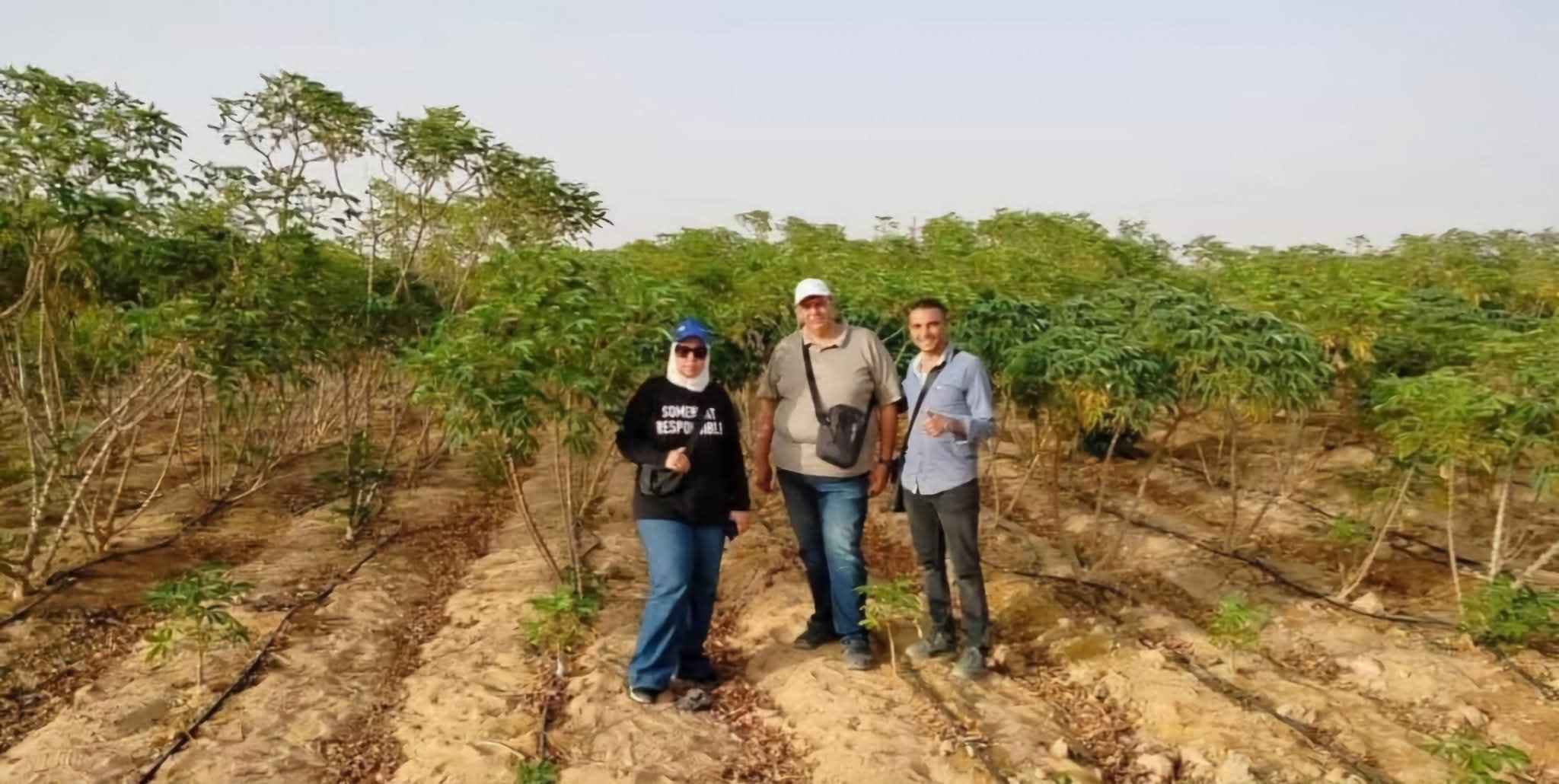

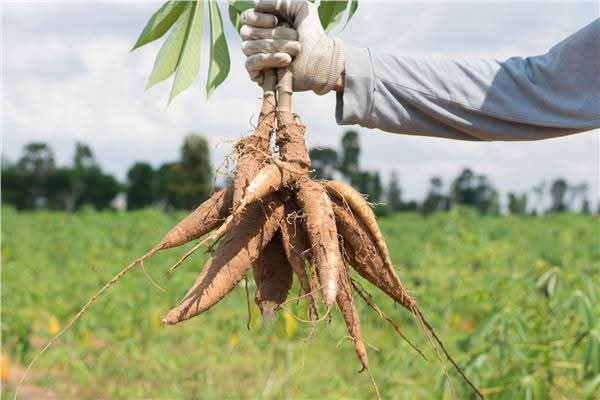
 هل لديك سؤال ؟
هل لديك سؤال ؟

